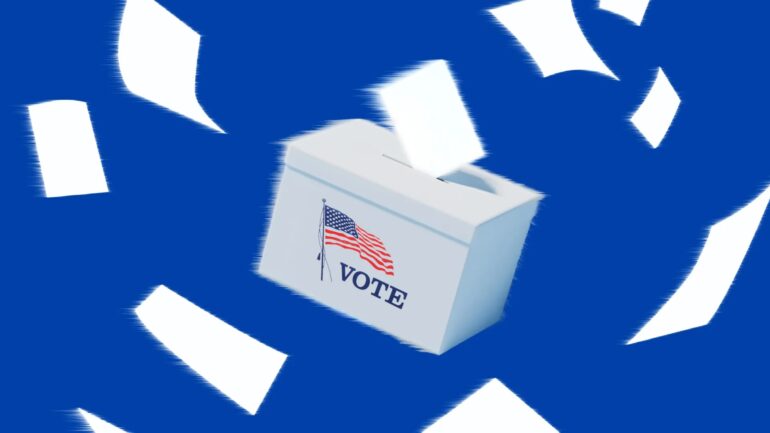Campaign ads blaring on every screen, political conversations filling our social media feeds and tense political conversations having characterized the past year leading up to a hotly contested election. It would be an understatement to say that the 2024 presidential election is top of mind. With the election taking up much of the focus of Americans, it is bound to cause feelings of anxiety and stress. In fact, a shocking 69% of American adults cited the presidential election as a significant source of stress according to a survey conducted by the American Psychological Association (APA).
While political stress isn’t new, it has grown noticeably worse over recent election cycles. In 2020, 68% of Americans reported stress related to the election, a notable increase from 52% in 2016. With each election perceived as increasingly high stakes, there has been a growing body of research on the effects of election related stress. What’s concerning is that political anxiety does not just affect those who suffer from general anxiety but seems to be its own distinct concept.
“When we’ve probed a little deeper, significant proportions of Americans report that because of politics, they lose sleep, have damaged social relationships and can’t stop paying attention to social media,” said Kevin B. Smith, PhD, a professor of political science at the University of Nebraska–Lincoln who studies political psychology and public policy.
A large portion of the population, 45 million Americans, have said that the election is negatively impacting their sleep according to a survey by the National Sleep Foundation, affecting individuals from all political affiliations. Further, the APA study highlights how the political climate has damaged personal relationships with 32% reporting that the political climate has caused strain between them and their family members.
One of the reasons that elections in particular are times of great stress is due to the uncertainty and the potential consequences resulting from the election results. As creatures that value predictability and an understanding of outcomes, times of uncertainty bring immense fear.
Dr. Judson Brewer, director of research and innovation at the Mindfulness Center at the Brown University School of Public Health explained that “The basic underlying process is that our brains really don’t like uncertainty. So, it’s not about who’s going to win. It’s about the uncertainty of who might win.”
While acknowledging that election anxiety brings great levels of stress to many Americans, many studies have shown that the fear and anxiety that comes with the territory of elections can actually spur political participation. A study conducted by psychologist Matthew Feinberg, PhD, found that political events that caused negative emotions and reduced physical well-being were also catalysts for political action. Similarly, efforts that individuals took to reduce the stress caused by politics such as reappraisal and distraction resulted in greater well-being but also less motivation to take action.
Such sentiment was reflected in the APA survey as 77% of respondents stated that they intended to vote in this election and half said that they felt more driven to volunteer or help bring about changes to support their values. This leaves us with a dilemma that extends beyond any single election cycle, how do we deal with stress without sacrificing our motivation for political involvement? Addressing this issue will likely require further research — and a careful balance between these two states.
Returning back to the current election cycle, how do we regulate the stresses of the election? The APA has several tips on how to minimize this perhaps inevitable anxiety. An important, perhaps obvious, way is to simply limit the noise of the 24-hour news cycle that constantly permeates our screens. This can mean switching your visual consumption of news with reading to have more control over the news you digest or creating dedicated blocks of time to check the news.
“The information environment has changed, making it much, much harder to ignore politics today,” Smith said. “It’s not something we’re getting in the morning with the newspaper and in the evening on the TV broadcast — it’s now constant, all the time.”
Simply anticipating stress related to the election is not enough to reduce stress and can actually increase stress, according to a study conducted by Shevaun Neupert, corresponding author of the study and a professor of psychology at NC State. Rather, Neupert found that using a method called problem analysis where you mentally engage the problem is far more effective. “Problem analysis, in this case, is when people think critically about why they believe they’ll experience election-related stress over the next 24 hours,” said Neupert.
Other tips include seeking peace and belonging in communities, including faith-based ones where emotional and spiritual support can prove to be crucial in getting through stressful times. Spending meaningful time in the presence of friends and family is also essential in mitigating stress.
Finally, simply taking care of your overall health by leaning into hobbies, spending time with people and things that bring you joy, spending time outside, and getting enough to eat and enough sleep are vital in coping with the all too familiar and pervasive election anxiety that unfortunately won’t simply disappear after Nov. 5. Effective coping strategies are necessary to prevent election stress from becoming deliberating each time election season comes up. No matter what the outcome is, because it simply won’t always be in your favor, being able to find the balance between engagement and crippling stress is essential to our health and an effective political system.




